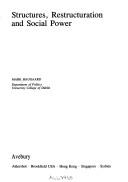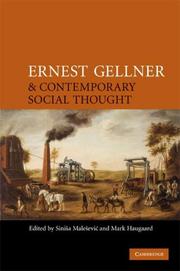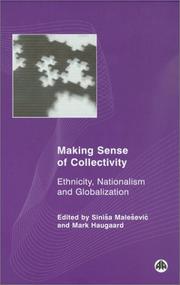| Listing 1 - 10 of 17 | << page >> |
Sort by
|
Book
ISBN: 0719038510 Year: 1997 Publisher: Manchester : Manchester university press,
Abstract | Keywords | Export | Availability | Bookmark
 Loading...
Loading...Choose an application
- Reference Manager
- EndNote
- RefWorks (Direct export to RefWorks)

ISBN: 1856283127 Year: 1992 Publisher: Aldershot : Avebury,
Abstract | Keywords | Export | Availability | Bookmark
 Loading...
Loading...Choose an application
- Reference Manager
- EndNote
- RefWorks (Direct export to RefWorks)
Agent (Philosophy) --- Power (Social sciences) --- Social structure --- Agent (Philosophie) --- Pouvoir (Sciences sociales) --- Structure sociale --- Giddens, Anthony
Book
ISBN: 9781526110374 1526110377 Year: 2020 Publisher: Manchester Manchester University Press
Abstract | Keywords | Export | Availability | Bookmark
 Loading...
Loading...Choose an application
- Reference Manager
- EndNote
- RefWorks (Direct export to RefWorks)
In this accessible and sophisticated exploration of the nature and workings of social and political power, Mark Haugaard examines the interrelation between domination and empowerment. Building upon the perspectives of Steven Lukes, Michel Foucault, Amy Allen, Hannah Arendt, Anthony Giddens, Pierre Bourdieu and others, Haugaard offers a clear theoretical framework, delineating power in four interrelated dimensions. The first and second dimensions of power entail two different types of social conflict. The third dimension concerns tacit knowledge, uses of truth and reification. Drawing upon genealogical theory and accounts of slavery as social death, the fourth dimension of power concerns the power to create social subjects. The book concludes with an original normative pragmatist power-based account of democracy. Offering lucid and entertaining illustrations of complex theoretical perspectives, this book is essential reading for undergraduates, postgraduates and academics, while offering an indispensable guide for activists wishing to understand domination, resistance and empowerment. --
Power (Social sciences) --- Political science --- Political aspects --- Psychological aspects --- Philosophy
Book
ISBN: 0719057280 Year: 2002 Publisher: Manchester ; New York Manchester University Press
Abstract | Keywords | Export | Availability | Bookmark
 Loading...
Loading...Choose an application
- Reference Manager
- EndNote
- RefWorks (Direct export to RefWorks)

ISBN: 9780521882910 9780521709415 0521882915 0521709415 9780511488795 9780511371387 0511371381 0511488793 9780511370403 0511370407 1281156027 9781281156020 9780511369902 1107185610 9781107185616 9786611156022 661115602X 0511369360 9780511369360 0511370911 9780511370915 0511369905 9780511369902 Year: 2007 Publisher: Cambridge ; New York : Cambridge University Press,
Abstract | Keywords | Export | Availability | Bookmark
 Loading...
Loading...Choose an application
- Reference Manager
- EndNote
- RefWorks (Direct export to RefWorks)
Ernest Gellner was a unique scholar whose work covered areas as diverse as social anthropology, analytical philosophy, the sociology of the Islamic world, nationalism, psychoanalysis, East European transformations and kinship structures. Despite this diversity, there is an exceptional degree of unity and coherence in Gellner's work with his distinctly modernist, rationalist and liberal world-view evident in everything he wrote. His central problematic remains constant: understanding how the modern world came into being and to what extent it is unique relative to all other social forms. Ten years after his death, this book brings together leading social theorists to evaluate the significance of Gellner's legacy and to re-examine his central concerns. It corrects many misunderstandings and critically engages with Gellner's legacy to provide a cutting edge contribution to understanding our contemporary post-9/11, global, late modern, social condition.
Gellner --- Social thought --- Social science --- Social sciences --- Philosophy. --- Gellner, Ernest. --- Gellner. --- Social thought. --- Social philosophy --- Social theory --- Philosophy --- Gelnŭr, Ŭrnest --- Gellner, Ernest --- Social Sciences --- Sociology

ISBN: 9780745319377 9780745319360 9781849641586 1849641587 0745319378 074531936X Year: 2002 Publisher: London Pluto Press
Abstract | Keywords | Export | Availability | Bookmark
 Loading...
Loading...Choose an application
- Reference Manager
- EndNote
- RefWorks (Direct export to RefWorks)
This is a new era where the very notion of collective identity is challenged.
Sociology of culture --- Group identity. --- Ethnicity. --- Nationalism. --- Cultural pluralism. --- Cultural diversity --- Diversity, Cultural --- Diversity, Religious --- Ethnic diversity --- Pluralism (Social sciences) --- Pluralism, Cultural --- Religious diversity --- Culture --- Cultural fusion --- Ethnicity --- Multiculturalism --- Consciousness, National --- Identity, National --- National consciousness --- National identity --- International relations --- Patriotism --- Political science --- Autonomy and independence movements --- Internationalism --- Political messianism --- Ethnic identity --- Group identity --- Cultural pluralism --- Collective identity --- Community identity --- Cultural identity --- Social identity --- Identity (Psychology) --- Social psychology --- Collective memory
Book
ISBN: 9783866491052 3866491050 3866495161 9783866495166 Year: 2012 Publisher: Opladen, Germany Barbara Budrich
Abstract | Keywords | Export | Availability | Bookmark
 Loading...
Loading...Choose an application
- Reference Manager
- EndNote
- RefWorks (Direct export to RefWorks)
Although the concept of power is central to the study of politics, there is no agreement as to what exactly power is. Power is often viewed negatively, as domination, though it is also the case that power is created by people acting in concert, in which case it can have positive effects. Making sense of this puzzle is one of the aims of this book, which provides the reader with a clear and coherent way of understanding the various forms and manifestations of power, and it does so by bringing together the most important and influential perspectives on power within the political and social sciences. From the Contents: Mark Haugaard and Kevin Ryan: Power in Social and Political Theory John Gledhill: Power in Political Anthropology Stewart Clegg: Foundations of Organizational Power Jill Vickers: Gendering Power: Feminist Approaches John A. Hall and Siniša Maleševic: The Political Sociology of Power Philip G. Cerny: Power and International Relations Haugaard and Ryan succeed admirably in their task of giving a multi-perspectivaloverview of the most prominent disciplinary approaches to the study ofpower in social and political theory, political anthropology, organizational studies,feminist/gender studies, political sociology, and international relations. Journal of Political Power 2014
Power (Social sciences). --- Political sociology. --- Power (Social sciences)
Book
ISBN: 9786613812001 1282238736 085702101X 1446206718 Year: 2009 Publisher: London ; Thousand Oaks, Calif. : SAGE,
Abstract | Keywords | Export | Availability | Bookmark
 Loading...
Loading...Choose an application
- Reference Manager
- EndNote
- RefWorks (Direct export to RefWorks)
Power is arguably one of the key concepts within the social sciences. This title is ideal for any student or researcher wishing to initiate themselves in the state-of-the-art.
Book
ISBN: 3866495161 9783866495166 3866491050 9783866491052 Year: 2012 Publisher: Opladen, Germany Barbara Budrich
Abstract | Keywords | Export | Availability | Bookmark
 Loading...
Loading...Choose an application
- Reference Manager
- EndNote
- RefWorks (Direct export to RefWorks)
Although the concept of power is central to the study of politics, there is no agreement as to what exactly power is. Power is often viewed negatively, as domination, though it is also the case that power is created by people acting in concert, in which case it can have positive effects. Making sense of this puzzle is one of the aims of this book, which provides the reader with a clear and coherent way of understanding the various forms and manifestations of power, and it does so by bringing together the most important and influential perspectives on power within the political and social sciences. From the Contents: Mark Haugaard and Kevin Ryan: Power in Social and Political Theory John Gledhill: Power in Political Anthropology Stewart Clegg: Foundations of Organizational Power Jill Vickers: Gendering Power: Feminist Approaches John A. Hall and Siniša Maleševic: The Political Sociology of Power Philip G. Cerny: Power and International Relations Haugaard and Ryan succeed admirably in their task of giving a multi-perspectivaloverview of the most prominent disciplinary approaches to the study ofpower in social and political theory, political anthropology, organizational studies,feminist/gender studies, political sociology, and international relations. Journal of Political Power 2014
domination --- empowerment --- Power --- Political sociology. --- Power (Social sciences)
Book
ISBN: 9780367863128 Year: 2020 Publisher: Abingdon Routledge
Abstract | Keywords | Export | Availability | Bookmark
 Loading...
Loading...Choose an application
- Reference Manager
- EndNote
- RefWorks (Direct export to RefWorks)
| Listing 1 - 10 of 17 | << page >> |
Sort by
|

 Search
Search Feedback
Feedback About UniCat
About UniCat  Help
Help News
News